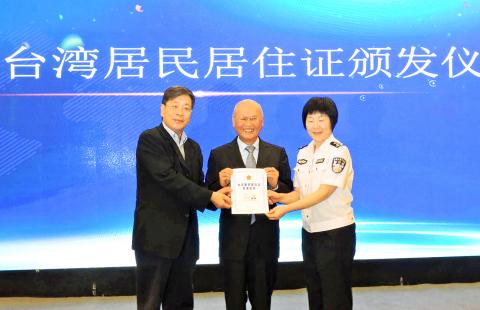The Mainland Affairs Council’s proposed measures to counter China’s new residency permit cards for Taiwanese are among the Executive Yuan’s priorities for the new legislative session, sources said yesterday.
The council is to propose draft amendments to the Act Governing Relations Between the People of the Taiwan Area and the Mainland Area (臺灣地區與大陸地區人民關係條例) that would require holders of Chinese residency cards to report to authorities, said high-ranking officials who declined to be named, adding that the council has yet to decide whether to bar cardholders from holding public office or national security-related positions.
The draft amendments are to be proposed as a priority bill for the legislative session that begins tomorrow, alongside 41 other priority bills, the officials said.

Photo: CNA, courtesy of a reader
Premier William Lai (賴清德) is scheduled to hold a briefing with Democratic Progressive Party (DPP) legislators today to discuss bills that should be prioritized in the new session.
The act needs to be amended because China’s residency card is designed to evade provisions in the act that bans Taiwanese from simultaneously holding household registrations in Taiwan and China, officials said, adding that China treats residency cardholders as Chinese citizens, although they do not hold household registrations.
The policy is a “united front” ploy and a threat to national security, they said.
The Chinese State Council Information Office on Aug. 16 announced that, starting on Sept. 1, Taiwanese, Hong Kongers and Macanese who have lived in China for more than six months and are legally working, living or studying in the nation would be eligible to apply for a residence card.
Cardholders are granted certain rights and benefits enjoyed by Chinese citizens, such as compulsory education, social insurance and housing subsidies.
DPP Legislator Wang Ting-yu (王定宇) had said he would propose an amendment that would cancel cardholders’ household registration in Taiwan, but officials said they would discuss the bill first with legislators.
The council currently has no plan to cancel cardholders’ household registration, but that does not mean it never will, they added.
Other national security-related priority bills for the session include amendments to the act to regulate illegal investment activities by Chinese nationals in Taiwan, and to ban high-ranking government officials and retired military officers from attending political events in China for 15 years after their retirement, as well as draft amendments to the Classified National Security Information Protection Act (國家機密保護法), they said.
Also included are the general budget plan for next year and more than 20 economy-related bills, such as draft amendments to the Securities and Exchange Act (證券交易法), the Urban Renewal Act (都市更新條例), the Futures Trading Act (期貨交易法) and the Trademark Act (商標法), they added.

MAKING WAVES: China’s maritime militia could become a nontraditional threat in war, clogging up shipping lanes to prevent US or Japanese intervention, a report said About 1,900 Chinese ships flying flags of convenience and fishing vessels that participated in China’s military exercises around Taiwan last month and in January last year have been listed for monitoring, Coast Guard Administration (CGA) Deputy Director-General Hsieh Ching-chin (謝慶欽) said yesterday. Following amendments to the Commercial Port Act (商港法) and the Law of Ships (船舶法) last month, the CGA can designate possible berthing areas or deny ports of call for vessels suspected of loitering around areas where undersea cables can be accessed, Oceans Affairs Council Minister Kuan Bi-ling (管碧玲) said. The list of suspected ships, originally 300, had risen to about

DAREDEVIL: Honnold said it had always been a dream of his to climb Taipei 101, while a Netflix producer said the skyscraper was ‘a real icon of this country’ US climber Alex Honnold yesterday took on Taiwan’s tallest building, becoming the first person to scale Taipei 101 without a rope, harness or safety net. Hundreds of spectators gathered at the base of the 101-story skyscraper to watch Honnold, 40, embark on his daredevil feat, which was also broadcast live on Netflix. Dressed in a red T-shirt and yellow custom-made climbing shoes, Honnold swiftly moved up the southeast face of the glass and steel building. At one point, he stepped onto a platform midway up to wave down at fans and onlookers who were taking photos. People watching from inside

Japan’s strategic alliance with the US would collapse if Tokyo were to turn away from a conflict in Taiwan, Japanese Prime Minister Sanae Takaichi said yesterday, but distanced herself from previous comments that suggested a possible military response in such an event. Takaichi expressed her latest views on a nationally broadcast TV program late on Monday, where an opposition party leader criticized her for igniting tensions with China with the earlier remarks. Ties between Japan and China have sunk to the worst level in years after Takaichi said in November that a hypothetical Chinese attack on Taiwan could bring about a Japanese

STREAMLINED: The dedicated funding would allow the US to transfer equipment to Taiwan when needed and order upgraded replacements for stockpiles, a source said The US House of Representatives on Thursday passed a defense appropriations bill totaling US$838.7 billion, of which US$1 billion is to be allocated to reinforcing security cooperation with Taiwan and US$150 million to replace defense articles provided to the nation. These are part of the Consolidated Appropriation Act, which the US House yesterday passed with 341 votes in favor and 88 against. The act must be passed by the US Senate before Friday next week to avoid another government shutdown. The US House Committee on Appropriations on Monday unveiled the act, saying that it allocates US$1 billion for the Taiwan Security Cooperation Initiative